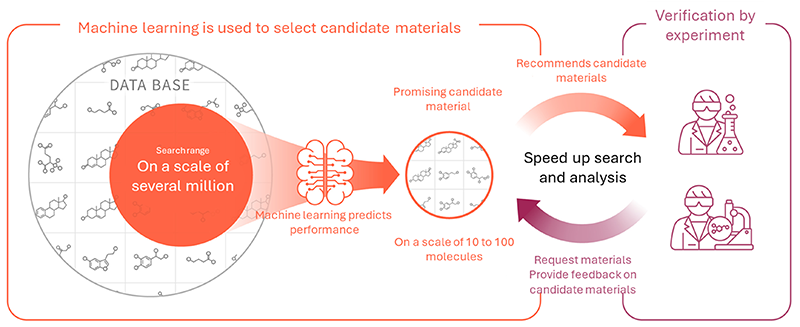2024
February 7, 2024
Kurita Begins Developing Low-Environmental-Impact Corrosion Inhibitor Using Materials Informatics with Fracta Leap
Kurita Water Industries Ltd. (Head Office: Nakano-ku, Tokyo; President: Hirohiko Ejiri; hereinafter "Kurita"), Fracta Leap Inc. (Head Office: Shinjuku-ku, Tokyo; President: Yasuhiro Kitabayashi; hereinafter "Fracta Leap"), which specializes in digital technology for water treatment and Kurita Europe GmbH, a consolidated subsidiary of Kurita, have collaborated to introduce Materials Informatics (MI)*1 in order to further streamline and accelerate the development of innovative solutions in Kurita Group's water treatment materials development field, and are utilizing this to begin developing a low-environmental-impact corrosion inhibitor *2 (hereinafter referred to as the new corrosion inhibitor).
Kurita and Fracta Leap are developing "Meta-Aqua Project," which aims to build innovative digital solutions for water treatment. By utilizing machine learning, simulation and other technologies, this project will provide customers with cutting-edge solutions that enable greater operational efficiency and highly advanced water treatment design, production and operations management. The project has recently introduced MI to further improve the efficiency and advancement of new material discovery by expanding machine learning the material development field.
The pioneer project to fully utilize MI in candidate material discovery for the Kurita Group is the development of the new corrosion inhibitor. Phosphorus, zinc, and nitrogen compounds have typically been used as corrosion inhibitor in cooling water systems, but due to safety concerns, the Netherlands and other European countries have been tightening regulations on the use of these substances. In order to quickly develop new corrosion inhibitor to replace conventional products, it was necessary to search for new potential materials as efficiently as possible.
In the development of the new corrosion inhibitor, MI-driven machine learning made it possible to narrow down promising candidate materials from the millions of molecules registered in external databases, dramatically speeding up the search and analysis process. Compared to the traditional manual (human) search method, which only covered a few hundred molecules, MI was able to search through millions of molecules using the same amount of time, which is 10,000 times faster.
In the field of material dissolution control*3 used in semiconductor manufacturing, preliminary verification of the effectiveness of MI has shown that it can already produce better search results than traditional manual methods.
The Kurita Group will continue to contribute to the realization of a sustainable society by applying MI to the fast-paced semiconductor industry and the field of materials development for water treatment to strengthen its fundamental technologies while accelerating the creation and delivery of solutions that save water, reduce greenhouse gas (GHG) emission and recycle resources.
Figure 1: MI-Driven Advanced Materials Discovery Process
- Notes
- *1 Materials Informatics (MI): An initiative to improve the efficiency of developing various materials, including organic, inorganic, and metallic materials, by using information science (informatics) such as machine learning. MI is anticipated to reduce the time required for material design and new material discovery by using machine learning to analyze vast amounts of material data.
- *2 Corrosion inhibitor: Phosphorus, zinc, and azole compounds are commonly used as corrosion inhibitor in cooling water systems. Due to the tightened regulations on the use of these materials in recent years in the Netherlands and other European countries, there is a need to replace them with low-environmental-impact corrosion inhibitor.
- *3 Dissolution control: As an example, controlling the dissolution of copper wiring is an issue in the wafer bonding process, which is one of the next-generation semiconductor manufacturing processes. Similar to copper, the need for dissolution control of new materials is expected to emerge in the future; therefore, the company intends to accelerate development through the use of MI.
<Reference: Company homepage>
Kurita Water Industries Ltd.
https://www.kurita.co.jp/
Fracta Leap, Inc.
https://fracta-leap.com/


